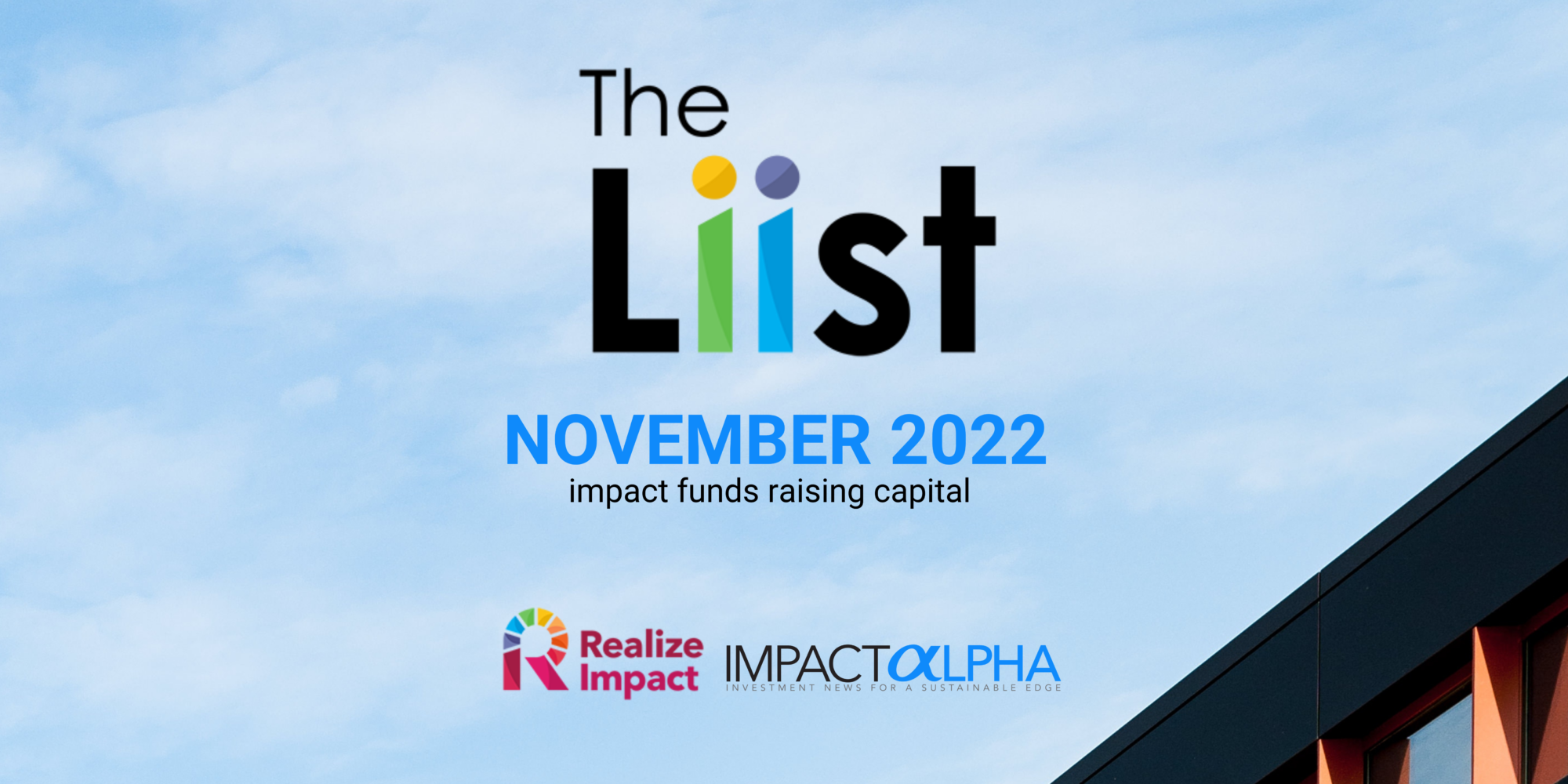ImpactAlpha, November 1 – Doomsday predictions abound. The world seems to have back-burnered climate action while wrestling with war in Ukraine and the looming global recession. This month’s COP27 meeting in Sharm El-Sheikh, Egypt, is being dismissed even before it starts.
A bright spot: The dedicated cohort of private climate investors that are marching forward to build and scale the pipeline of climate technologies and resilience-focused companies.
This month’s Liist, in partnership with Realize Impact, features a range of climate-focused investment funds in the market. Systemiq Capital in the U.K. is pumping growth capital into promising climate technologies. Propeller Ventures, a new fund from software entrepreneur Brian Halligan and the Woods Hole Oceanographic Institute, is building the next contingent of ocean-focused climate tech entrepreneurs – and it’s already raised $100 million to invest in new IP and commercialization of tech solutions for oceans, perhaps the most critical natural ecosystems. BlackTech Capital in Toronto is investing in Black-led climate ventures working toward a just economic transition.
Emerging market fund managers also are scoping climate strategies. Adaptation remains woefully underfunded relative to mitigation-based solutions, and invites a range of innovative strategies. Wangara Green Ventures is leveraging local market knowledge in Ghana to invest in companies supporting the green economic transition. India-based Omnivore is integrating a climate lens in agrifood tech investment boost the resilience of India’s food system and the millions of smallholder farmers it depends on.
This month’s Liist features four funds led or co-led by women, including Beyond Capital Ventures, which invests in companies delivering basic goods and services in East Africa and India, and Boston Impact Initiative, a place-based investor in Boston and greater New England whose mission is to close the region’s racial wealth gap.
- Propeller Ventures (global ocean-based climate tech)
- Wangara Green Ventures (green economy companies in Ghana; woman co-led)
- BlackTech Capital (Black-led climate ventures in North America; woman co-led)
- Beyond Capital Ventures fund II (impact tech startups in East Africa and India; women-led)
- Boston Impact Initiative (racial justice, place-based investing in Boston and greater New England; women-led)
- Systemiq fund II (global climate-tech)
- Omnivore fund III (agrifood tech investing in India)
Disclaimer: The LiiST and this post are based on available information, sourced by ImpactAlpha and our partner on The Liist, Realize Impact. Information has not been further reviewed by the managers nor verified by third parties, is not guaranteed for accuracy or completeness, and should not be relied upon as investment advice or recommendations. Nothing in The LiiST, this post or on ImpactAlpha.com shall constitute an offer to sell or the solicitation of an offer to buy securities.

Propeller Ventures invests in and builds companies using science and technology to address the climate crisis through ocean-based solutions.
The Boston-based fund was launched this year by Brian Halligan, co-founder of software company Hubspot, in partnership with the Woods Hole Oceanographic Institution. The fund has inked more than $100 million from investors. Halligan, who says oceans are “the planet’s best hope to decarbonize the global economy,” has committed his own capital.
Ocean tech. Propeller focuses on four types of ocean solutions: technologies that can track, account for, verify and remove ocean-based carbon; energy, packaging, pharmaceutical applications for marine organics, like algae and microbes; decarbonization technologies for high-polluting maritime industries, like shipping; and energy and desalination tech.
“Propeller’s primary focus is on companies that can directly remove carbon or reduce GHG emissions,” a spokeswoman for the fund told ImpactAlpha. “However, we are happy to see many innovations that have co-benefits across biodiversity, pollution, and more.”
Entrepreneurs in residence. Propeller will make seed-stage equity investments. The model also includes an “entrepreneur in residence” acceleration program that has already backed several, as yet unannounced ventures. Grant funding from Woods Hole will support founders’ IP acceleration. The Propeller team can be reached at [email protected]. Read on.

Wangara Green Ventures invests in small businesses and startups advancing Ghana’s climate-resilient economic transformation. The Accra-based fund manager is raising a $10 million first fund to provide early funding for companies like WamiAgro, which is providing access to credit, markets and training for Ghana’s grain farmers.
“We look at how to help each company take the best approach to climate issues that they can,” Wangara’s Ebenezer Arthur told ImpactAlpha. A $200,000 convertible note is helping Netherlands-based sustainable toilet paper company The Good Roll ramp up its rural factory in Ghana and build up its network of smallholder bamboo farmers. Wangara’s portfolio also includes an insect-based agri-feed producer and a water treatment venture. Wangara has so far raised $5 million.
Climate pipeline. Wangara says there’s a solid pipeline of promising green, local companies in Ghana. It sources deals through accelerators and incubators, like the Ghana Climate Innovation Center. The four-year-old fund manager makes equity investments and convertible notes of up to $500,000, then helps portfolio companies on “climate action plans.”
Open for business. Wangara’s fund is domiciled in Ghana. Its Ghana-focused vehicle aims to test the waters for a larger fund to support green small and growing businesses across West Africa, says Arthur.
Background reading. “How The Good Roll and Wangara Green Ventures are saving trees and creating green jobs in Ghana.”

BlackTech Capital backs early-stage Black and other underrepresented founders that are building solutions to the climate crisis.
The Toronto-based fund manager focuses on pre-seed but post-revenue companies valued at less than $10 million and cuts checks of up to $500,000. It has supported companies like Mars Materials, which is repurposing captured-CO2 and bio-based feedstocks to decarbonize high-emitting industries. Its first fund aims to raise C$15 million (about US$11 million) for both equity and non-dilutive investments.
Deal-sourcing. BlackTech Capital says it is both “proactive and reactive” in sourcing investments. Proactively, it is building its network of university and professional communities across North America. It also takes referrals from its investor network and its engagement with Techstars, Alabama-based g8 and Climatebase, as well as from LinkedIn. BlackTech Capital is looking to expand to Africa through a partnership with Barka Fund.

Beyond Capital Ventures is a women-led venture capital fund that invests in startups delivering basic goods and services to consumers in East Africa and India.
The U.S. and Bermuda-based fund focuses on healthcare, fintech and climate adaptation and makes seed, Series A and bridge-round equity investments. Beyond Capital has made 21 investments, including eight from its second fund. Among them: Kigali-based Viebeg, a health tech venture that helps underserved healthcare providers secure medical supplies through inventory management, shipping, warehousing and last-mile distribution. Jaipur, India-based Frontier Markets uses a network of female sales agents to deliver essential products, including solar lighting, to India’s rural households. Kampala-based Xeno helps Africans set and achieve savings and investment goals.
Beyond Capital says its portfolio companies are impacting the lives of 56 million people, including 42 million women, and have created more than 50,000 jobs.
Profit-share. Beyond Capital pegs itself as a “founder friendly” VC firm. That starts with a collaborative and transparent due diligence process, and includes access to its networks and mentoring to support portfolio companies. Its profit-share arrangement offers founders a portion of Beyond Capital’s carry. Founders can earn additional upside by meeting specific gender-based targets.
“This structure challenges traditional power dynamics by inviting founders to be owners in our work, and actually incentivizing impact-driven outcomes,” says Beyond Capital’s Eva Yazhari.
Open for business. Beyond Capital’s second fund reached a first close of $11 million toward its $20 million target in April. It’s backed by The Impact Investors Inc., Equilibria Capital and ShahCap Family Office. The 10-year, closed-ended fund will hold its final close Nov. 30. Contact Mathilde Beniflah at [email protected].

Boston Impact Initiative, a charitable loan fund, aims to close the city’s racial wealth divide by supporting access to capital for businesses run by people of color. It launched in 2013 with a goal to ensure that “economic and racial justice becomes integral to any community-centered investment strategy.”
BII’s fund, which aims to raise $20 million, broadens the organization’s place-based impact investing focus to the whole of New England. The fund provides below-market debt, patient equity and strategic grantmaking to businesses like ChopValue Boston, which secured $600,000 to build a “microfactory” in Charlestown, Mass., to make and sell wood products from discarded chopsticks. The fund has also backed East Boston Neighborhood Trust, a mixed-income housing trust acquires and preserves affordable multi-family properties in a rapidly gentrifying neighborhood.
Open for business. BII’s fund is open to non-accredited and accredited investors and philanthropists.
Background reading. “Local funds model the racial reckoning and renewal central to the COVID recovery.”

Systemiq Capital provides early and growth-stage equity investments to sustainable startups in Europe and North America. The investment firm is a spinout of climate advisory firm SYSTEMIQ Ltd., based in London. The firm is looking to raise $200 million for its second fund to invest in late seed, Series A and B deals for sustainable food and materials companies, clean transport, climate intelligence and finance, and climate restoration.
Track record. Systemiq Capital’s first fund was an early backer of hydrogen-powered aircraft manufacturer ZeroAvia, which has gone on to raise more than $140 million in venture funding. Portfolio company Nature Metrics, an “environmental DNA database” recently clinched $15 million in Series B funding to support biodiversity monitoring. Jupiter Intelligence, which helps industries assess and mitigate climate risks to their physical assets, has raised $88 million.
Open for business. Systemiq Capital reached a first-close of $70 million for its Luxembourg-domiciled second fund. Backers include Swiss private bank Lombard Odier, the Grantham Foundation, Dara Holdings, Deutsche Post Foundation and a number of high-net-worth individuals.

Omnivore is an India-focused impact venture capital firm that funds entrepreneurs working to improve the country’s agriculture and food systems.
The agriculture sector in India is dominated by more than 300 million smallholder farmers, most of whom lack access to quality inputs, financing, markets and support services. Omnivore invests in startups developing breakthrough technologies that strengthen and streamline the agrifood value chain, support climate resilience and enhance the rural economy.
The firm has backed more than 40 startups. It is looking to raise $130 million for its third venture fund, which is domiciled in India with a Singapore-based feeder fund. The firm’s impact reporting is BlueMark-verified.
Track record. Omnivore firm was among the earliest investors in agri-marketplace DeHaat, which has raised nearly $240 million, including the first $46 million of its Series E round in October. Despite news of layoffs at the company – now common to many tech startups as tech growth and the global economy turn down – the company could become India’s first agtech unicorn. Omnivore’s portfolio also includes crop warehousing and financing venture Arya and ReshaMandi, which is digitizing the natural fibers supply chain.
First close. Omnivore’s third fund is backed by American and Dutch development finance institutions DFC and FMO. The firm is targeting a first close by the end of the year.











